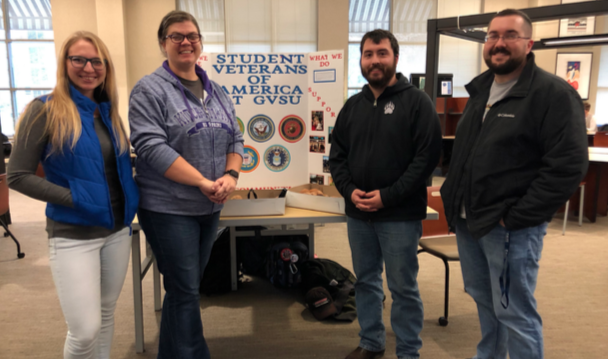Laker Vets reflect on service following Veterans Day
Nov 19, 2018
There are several paths a high school graduate can take when deciding how to further their education or career. For some, it is leaving home to attend a college or university for a degree. For others, it is leaving home to serve their country.
Among the veterans who have returned to west Michigan, a group has united to begin their college career after years of service around the world. Grand Valley State University is home to just one chapter of Student Veterans of America, or as the GVSU students have now renamed the group, Laker Vets.
Laker Vets holds numerous events to connect both traditional students and student veterans. Last Friday, the group participated in a ‘ruck’ march, marching close to three miles with backpacks. Breaks were provided along the way to share stories of service. They meet every Friday at 2:30 p.m. to run at the clock tower, they can be found at Kirkhof tabling for mental health awareness and host can drives and a supply drive for the homeless veterans shelter in Grand Rapids.
On Nov. 12, the Laker Vets honored Veterans Day with a meeting in the DeVos Center. On display were posters containing information about each branch, post traumatic stress disorder and Student Veterans of America. The Laker Vets shared about their lives in the Coast Guard, Marine Corps, Army and Navy.
No decision to serve is alike, but many veterans spoke in unison about what they missed the most: the camaraderie. Serving in the armed forces is a different culture, but once you’re in it, the people around you have your back no matter what.
“When you’re in the Marine Corps, you’re a recruit,” Marines graduate Ethan Berens said. “There’s this recruit, that recruit, there’s no me (or) I. You can’t speak like that because you are moving and thinking as one unit.”
Berens served in the combat MOS artillery unit and is now deciding between an information technologies or computer sciences major with a minor in history. Berens joined to continue his great-granddad’s, granddad’s and father’s legacy of service.
“(I miss) the traveling,” Berens said. “I’ve been to North Carolina, California and back seven or eight times, and every other state in between. I miss the ocean because you could sit out right at sunset and watch the dolphins dance through water.”
Stephanie Owen joined the Coast Guard at 25 years old. She served as a operations dispatcher and then worked in damage control. She now studies Criminal Justice with a Juvenile Justice minor and is treasurer of Laker Vets.
“Not one day was (exactly) like the other,” Owen said. “(But) I had a mission. I had a purpose. I had a distinct purpose.”
Sarah Anderson joined the Marine Corps when she was 18 years old. Without family members who served, she recalls getting used to the culture shock.
“My biggest thing in high school was sports,” Anderson said. “I liked running, being active and challenging myself in ways. The Marine Corps promised me a challenge and they definitely delivered on it. It attracts good, old country boys and progressive women. Those two cultures clash. It (took time) getting used to different cultures on how they perceive roles in society. I wouldn’t say it’s another level above or below, it’s just a different culture.”
Anderson said she worked as a journalist for the Observation Post in California.
“I took photos and wrote stories about what was going on and sent it back home to the families,” Anderson said. “The newspaper fazed out because we found social media was the best way to inform people. We started focusing more on short videos and imagery.”
Anderson also wrote the talking points for generals’ speeches. After coming to GVSU, she is now vice president of communications for Laker Vets and studies advertising and public relations because it is similar to what she was doing near the end of her service.
Army veteran John Gellert, who was recently accepted into the GVSU nursing program, earned his associates degree before enlisting for six years.
“The camaraderie is the main thing,” Gallert said. “It’s the people. They’re all good people. You fall in love with them. (You decide to) stick together. The Army itself is like any job. You have to deal with stupid stuff, good stuff, bad stuff. But it’s the people. The people make it.”























